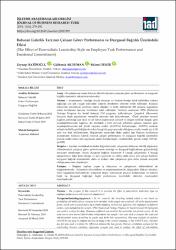| dc.contributor.author | Hatipoğlu, Zeynep | |
| dc.contributor.author | Akduman, Gülbeniz | |
| dc.contributor.author | Demir, Bülent | |
| dc.date.accessioned | 2021-05-28T12:45:28Z | |
| dc.date.available | 2021-05-28T12:45:28Z | |
| dc.date.issued | 2019 | en_US |
| dc.identifier.citation | HATİPOĞLU, Zeynep, Gülbeniz AKDUMAN & Bülent DEMİR. "Babacan Liderlik Tarzının Çalışan Görev Performansı ve Duygusal Bağlılık Üzerindeki Etkisi". İşletme Araştırmaları Dergisi, 11.1 (2019): 279-292. | en_US |
| dc.identifier.uri | https://www.isarder.org/2019/vol.11_issue.1_article23_full_text.pdf | |
| dc.identifier.uri | https://hdl.handle.net/11352/3571 | |
| dc.description.abstract | Araştırmada, olasılığa dayalı olmayan ve herkesi örneğe dahil edilebilme imkanı
sağladığı için çok yaygın kullanılan kolayda örnekleme yöntemi tercih edilmiştir. Kolayda
örnekleme yöntemiyle çevrimiçi olarak ulaşılan ve farklı sektörlerde 200 çalışana uygulanan
anket formlarının tamamı örnekleme dahil edilmiştir. Verilerin analizinde SPSS (Statistical
Package Program for Social Science) 21.0 programı kullanılmıştır. Çarpıklık (Skewness)
katsayısı ölçek puanlarının normallik sınaması için kullanılmıştır. Ölçek puanları normal
dağılım gösterdiği için ölçek ve alt boyut puanlarının cinsiyet ve doğum tarihine (kuşak) göre
karşılaştırılmasında bağımsız iki örneklem t testi; mevcut şirketteki çalışma süresine göre
karşılaştırılmasında tek yönlü varyans analizi (ANOVA) kullanılmıştır. ANOVA testinde
anlamlı farklılık görüldüğünde farkın hangi iki grup arasında olduğunu analiz etmek için LSD
post hoc testi kullanılmıştır. Değişkenler arasındaki ilişki analizi için Pearson korelasyon
analizinden; babacan liderlik tarzının çalışan performansı ve duygusal bağlılık üzerindeki
etkisini analiz etmek için regresyon analizi kullanılmıştır. Analizlerdeki güven aralığı %95’dir. | en_US |
| dc.description.abstract | In the research, the sampling method which is not based on
probability and which allows everyone to be included in the sample was preferred. All of the questionnaire
forms, which were accessed online by a simple sampling method and applied to 200 employees in different
sectors, were included in the sample. SPSS (Statistical Package Program for Social Science) 21.0 program
was used to analyze the data. Skewness coefficient was used for the normality test of scale scores. As the
scale scores were normal distribution, independent two sample t-test was used to compare the scale and
sub-dimension scores according to gender and birth date (generation); One-way analysis of variance
(ANOVA) was used to compare the time of study in the current company. In the ANOVA test, LSD post
hoc test was used to analyze the difference between the two groups. Pearson correlation analysis for the
relationship between variables; regression analysis was used to analyze the effect of paternalistic leadership style on employee performance and emotional commitment. The confidence interval in the
analyzes was 95%. (P <0.05) | en_US |
| dc.language.iso | tur | en_US |
| dc.publisher | İsarder | en_US |
| dc.relation.isversionof | 10.20491/isarder.2019.599 | en_US |
| dc.rights | info:eu-repo/semantics/openAccess | en_US |
| dc.subject | Babacan Liderlik | en_US |
| dc.subject | Görev Performansı | en_US |
| dc.subject | Duygusal Bağlılık | en_US |
| dc.subject | Paternalistic Leadership | en_US |
| dc.subject | Task Performance | en_US |
| dc.subject | Emotional Commitment | en_US |
| dc.title | Babacan Liderlik Tarzının Çalışan Görev Performansı ve Duygusal Bağlılık Üzerindeki Etkisi | en_US |
| dc.title.alternative | The Effect of Paternalistic Leadership Style on Employee Task Performance and Emotional Commitment | en_US |
| dc.type | article | en_US |
| dc.relation.journal | İşletme Araştırmaları Dergisi | en_US |
| dc.contributor.department | FSM Vakıf Üniversitesi, Meslek Yüksekokulu, Sivil Havacılık Kabin Hizmetleri Bölümü | en_US |
| dc.contributor.authorID | https://orcid.org/0000-0002-9437-610X | en_US |
| dc.contributor.authorID | https://orcid.org/0000-0002-3256-982X | en_US |
| dc.contributor.authorID | https://orcid.org/0000-0002-9451-1842 | en_US |
| dc.identifier.volume | 11 | en_US |
| dc.identifier.issue | 1 | en_US |
| dc.identifier.startpage | 279 | en_US |
| dc.identifier.endpage | 292 | en_US |
| dc.relation.publicationcategory | Makale - Uluslararası Hakemli Dergi - Kurum Öğretim Elemanı | en_US |
| dc.contributor.institutionauthor | Akduman, Gülbeniz | |



















